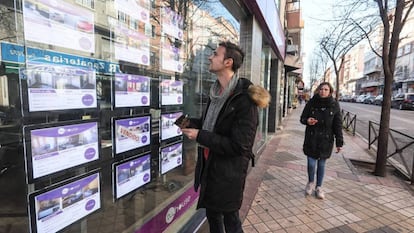Spanish youths: trapped at home with mom and dad
Nearly 50% of Madrid’s 18- to 35-year-olds cannot move out due to low pay, high property prices and the boom in holiday rentals

Coinciding with the holiday rental boom in Madrid, 48% of people between the ages of 18 and 35 continue to live with their parents. In no other region in Spain have property prices risen as much in the last year – 10.9% according to the National Statistics Institute (INE). Nor does any other region have such high rental prices – €13.09 per square meter. This is a historic high, according to the online property platform Fotocasa.
Of all the Madrid youths who moved out of the family home in 2017, 64.9% opted for an apartment rental. But low salaries, the proliferation of Airbnb-style platforms and the relentless rise in rent is making even this option almost as unattainable as a mortgage.
Rent in the Madrid region cost €5 more per square meter than the national average
“More renting leads to greater numbers of youths becoming independent,” says sociology professor Enrique Gil Calvo. “The problem is that there is far more demand than supply due to the “touristification” of Madrid, which has pushed up rent, making it harder to leave the family home.”
Rent in the Madrid region cost €5 more per square meter than the national average. Although the capital has led the price hikes, the trend is region-wide: 19 of the 27 towns around Madrid analyzed by Fotocasa registered a rise in rents last year. And as each month passes, it is harder for Madrid’s youngsters to take that important step into the outside world.
“The only way youngsters in the city center can become independent is to share an apartment with roommates,” says Saturnino Vera, spokesman for the Latina Neighborhood Association. “The prices are beyond their reach. And that’s linked to the tourist apartments. The estate agents now even want ground-floor commercial premises to rent them out.”

While companies specializing in holiday rentals insist that their activity is not affecting the residential rental market as it focuses on properties that are already occupied and whose owners simply want to make some extra cash, real estate agents have been extending the business to encompass empty properties that could otherwise have been used for long-term rentals.
“We have been thrust into the sector because investors who are buying from us want to rent their properties out to tourists,” says Maribel Contreras, who runs the agency Red Piso in Latina.
While this trend pushes up the price of buying as well as renting, an Airbnb spokesman insisted that “the number of Airbnb apartments on offer, compared with the total stock of properties, is too small to make a significant impact on the number of available properties and on final rent prices.”
He goes on to say that in cities such as Madrid and Barcelona, the number of properties that are exclusively used by tourists is less than 1% of the total stock, adding that listings for entire apartments that went on to be booked for more than 90 nights in 2017 in Madrid represented only 0.3% of the total number of properties in the city.
“In Palma de Mallorca, rental prices keep rising despite the fact that the supply [of tourist apartments] has been reduced by half,” he argues, referring to the capital of the Balearic island that has banned tourist apartments and confined the activity to stand-alone family homes. “Airbnb wants to work with the authorities to regulate on the basis of facts, to guarantee that residents can share their own home.”
Youth: a precarious state
Of course, this is not the only reason why almost 50% of young Madrileños are still living with their parents. Several other factors have been flagged up by the 2018 Youth Development Index, drawn up by the Reina Sofía Center, which compares the situation of young people in the different regions of Spain and in other EU countries. Unemployment, short-term contracts and low salaries are reportedly just as responsible for keeping them trapped at home.
“Madrid, Catalonia and Navarre have the highest numbers of young people who move out,” says a spokesman for the Reina Sofía Center. “However, in 2018 in the Madrid region, this did not exceed 13% of 20- to 24-year-olds and 43% of 25- to 29-year-olds. In the index’s 10-year time series (2009-2018), a strong link between emancipation and employment was revealed. During the economic crisis, the figures across Spain went down along with the employment figures and Madrid was no exception. The economic recovery in the last few years has been steady but slow and we still haven’t reached the pre-crisis levels of either employment or youth independence in the Madrid region. Madrid and Barcelona are the cities where the biggest share of the salary goes to housing.”
Youngsters who opt for a mortgage are the minority. Apartment shares with friends or strangers is the most common option when striking out on their own. But independence is coming at an increasingly high price and for some, it is simply not possible.
English version by Heather Galloway.
Tu suscripción se está usando en otro dispositivo
¿Quieres añadir otro usuario a tu suscripción?
Si continúas leyendo en este dispositivo, no se podrá leer en el otro.
FlechaTu suscripción se está usando en otro dispositivo y solo puedes acceder a EL PAÍS desde un dispositivo a la vez.
Si quieres compartir tu cuenta, cambia tu suscripción a la modalidad Premium, así podrás añadir otro usuario. Cada uno accederá con su propia cuenta de email, lo que os permitirá personalizar vuestra experiencia en EL PAÍS.
¿Tienes una suscripción de empresa? Accede aquí para contratar más cuentas.
En el caso de no saber quién está usando tu cuenta, te recomendamos cambiar tu contraseña aquí.
Si decides continuar compartiendo tu cuenta, este mensaje se mostrará en tu dispositivo y en el de la otra persona que está usando tu cuenta de forma indefinida, afectando a tu experiencia de lectura. Puedes consultar aquí los términos y condiciones de la suscripción digital.









































